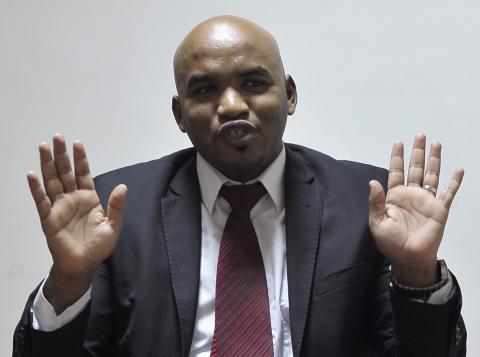Advertisement
Support Crumbles In East Libya For Oil Blockade Leader
AJDABIYA, Libya (Reuters) - Support is ebbing in east Libya for a six month blockade of its three oil ports, and for former rebel commander Ibrahim al-Jathran whose force led the seizure.
Even Jathran's own tribe and leaders in its hometown speak angrily about getting exports flowing again as capital Tripoli warns it may no longer be able to pay public salaries because the blockade has slashed oil revenues.
Surveying the potholed roads and abandoned buildings of Ajdabiya, mayor Salem Abdullah is all for fighting for more autonomy and oil wealth from the central government - but not for the blockade.
"We are opposed the closure of the oil ports," he told Reuters. "This has had a very, very negative impact."
Many in the impoverished town had long sympathized with Jathran, who was jailed under Muammar Gaddafi and fought alongside rebels to help oust the autocratic leader in 2011.
Despite its proximity to the oil ports of Brega and Zueitina, Ajdabiya never enjoyed the benefits of oil wealth. Burned out tanks and cars sit just outside it, testimony to heavy fighting between rebels and Gaddafi troops.
Many in the town now question the credentials of Jathran, the self-appointed defender of the east, the cradle of the revolution. In his early 30s, he is considered young for a leader in a conservative society dominated by tribal elders.
"The right way for us to have been represented would be by elections," Abdullah said, slamming his right hand on the office desk in frustration. "If you want to represent by force you cannot talk in name of the people."
Some now fear Jathran's port mutiny has damaged the popular cause for a federalist state based on three regions that existed in the pre-Gaddafi era, where eastern Cyrenaica, western Tripolitania and southern Fezzan enjoyed more autonomy.
TRIBAL PRESSURE
Jathran's al-Magharba tribe is pressuring him to withdraw his men to free up at least 600,000 barrels a day of badly needed oil exports. Several meetings have been held though an attempt to negotiate failed in December.
"Sit-ins in front of ports to demand your rights are fine... but shutting down ports is not acceptable. Oil is Libya's only income and belongs to all Libyans," said Saleh Atawich, the top Magharba leader.
Some fellow tribesmen are disappointed that Jathran did not open the ports on Dec 15 after lengthy talks were held at a tribal gathering late last year.
"We met on Dec 10 and stressed the need to open the ports and ... Ibrahim Jathran confirmed to those assembled and to all Libyans that he would open the ports on Dec 15," Atawich said, sitting in his reception hall lined with sofas in a farm outside Benghazi, the east's main city.
In Benghazi, home to a university and a vibrant intellectual community largely sympathetic to the federalist cause, people see Jathran as a rural warlord exploiting chaos of post-revolt Libya to bully his way into politics.
"Ninety percent in Benghazi are not with Jathran because who Ibrahim Jathran is," said Youssef al-Gharyani, an activist who promotes Benghazi as economic capital and who works at state oil firm National Oil Corp (NOC).
"What is his education?," Gharyani said. "How can he lead?"
SELF-STYLED GOVERNMENT
Jathran has set up a self-declared Cyrenaica government which wants to use oil exports to build roads and strengthen security. His group has three key demands: A committee to oversee oil exports, a probe into oil corruption and a system to share oil revenues among the regions.
Late last year, he appointed 23 ministries in a ceremony broadcast with great fanfare by a television station in Ajdabiya, which he controls. Tribal elders gathered amid cheers and dramatic speeches.
But little can be seen of such a rule in Ajdabiya. His self-declared prime minister has taken temporary shelter with aides and relatives in a gated, small one-storey building, reachable only by a bumpy unpaved road.
Jathran, who did no respond to an interview request, mainly works from Brega in the former base of the petroleum protection force he commanded until he defected with his men in summer.
He has put the strength of his force at more than 20,000 but few in the east believe this, and some oil industry and local estimates put his troop levels at below 5,000.
"We don't think he has as many as he says," said Abdullah, the town council head.
Locals say Jathran faces pressure from his own men because the state cut salaries for those who defected. Some say a few of his troops left his ranks to claim back state wages.
Jathran says his self-appointed government has formed an oil company to sell crude by bypassing Tripoli's authority. His group has only appointed a director, and claims to rely otherwise on sympathetic former NOC staff.
But Gharyani, who is also a former senior official in the oil workers' union, disputed that. "He sent somebody to me and my friend and he asked us to join Jathran and build up (a new) NOC but we refused," he said.
Still, Jathran has his supporters in the desolate town where many feel they have lost out for years by Libya's vast oil wealth, first under Gaddafi and now after his fall.
Mabrouk Mohammed, head of the council's financial department, points to the town's hospital, first build in the 1970s, to serve 40,000 people. The town's population is now well over 160,000 inhabitants, he says.
"Jathran's demands are reasonable. We've never benefited from oil revenues," he said. "We need infrastructure, schools, hospitals."
(Editing by Patrick Markey and William Hardy)



















Add new comment